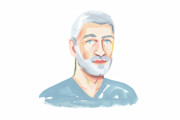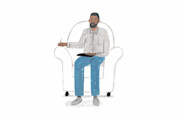Attention deficit hyperactivity disorder (ADHD) is not just a condition that affects kids.
Over the past 10 years, the mental health community and doctors have begun to better recognize and diagnose adults with ADHD.
"Only 10%-25% of adults with ADHD are diagnosed and adequately treated."
—Dr. Lenard A. Adler, M.D.
In fact, the official definition of ADHD was updated in the 2013 Diagnostic and Statistical Manual of Mental Disorders, fifth edition (DSM-5) to more accurately characterize the experience and symptoms of adults with ADHD.
During earlier years, the diagnostic definition of ADHD had been almost entirely focused on how the symptoms show up in children, rather than in adults.
Wondering if you might have adult ADHD?
Take our 3-Minute Adult ADHD Test to find out whether you are exhibiting the symptoms.
Unable to finish a task before moving on to the next one?
Difficulty paying attention during meeting?
Can’t find your cell phone or your damn keys again?
These are some symptoms of adult ADHD.
Before 2013, the definition had been almost entirely focused on how the symptoms of ADHD show up in children, rather than in adults.
"Unfortunately, the diagnosis of adult ADHD is vastly under-recognized," says Dr. Lenard A. Adler, M.D., Director of the adult ADHD program at New York University Medical Center in a 2014 article published in Innovations in Clinical Neuroscience.
"Only 10%-25% of adults with ADHD are actually diagnosed and adequately treated," he explains.
Taking that into account, it stands to reason that 75%-90% of adults with ADHD have not been officially diagnosed.
Below we’ll look at several surprising symptoms and some common myths—and a couple half-myths—about adult ADHD.

But first, what is ADHD?
Attention deficit hyperactivity disorder is a neurodevelopmental condition—this means it has to do with the development of the brain and nervous system.
ADHD symptoms fall under three categories:
Inattentive/disorganized
Hyperactive
A combination of the first two
Symptoms of inattention include daydreaming, forgetfulness, or poor organizational skills. Symptoms of hyperactivity are things like fidgeting, impatience, or a state of constant physical motion.
Untreated ADHD can lead to hindered professional or academic opportunities, low self-esteem, and even mental illnesses, including depression.

Surprising signs of ADHD in adults
Adults with ADHD likely don’t look or seem different than anyone else.
Take our 3-Minute Adult ADHD Test to find out whether you may have undiagnosed ADHD.
Untreated ADHD can be actively harmful.
Consequently, if you have several of the adult ADHD symptoms mentioned below, consider discussing with your primary care physician or a mental health professional, such as a therapist or clinical psychologist.
The Monarch Directory by SimplePractice makes it easy to find licensed therapists who specialize in diagnosing and treating ADHD.
1. Inability to focus or (perhaps surprisingly) hyperfocus
Adults with ADHD may struggle to follow the thread of a fairly simple conversation, or even television show thanks to their distractibility.
Conversely, they may get so absorbed in a particular task that they ignore all other stimuli.
2. Disorganization
They may struggle with finding logical places to house things or may easily forget where they’ve placed certain objects.
3. Issues with time management
Planning is a form of organization: it’s the mental organizing of time.
Because people with ADHD have trouble planning, they can be late, procrastinate, or forget about events entirely.
4. Other emotional or mental illnesses
Because people with ADHD sometimes struggle with tasks most others find simple, low self-esteem is really common among adults with ADHD, as is anxiety.
People with ADHD may be more withdrawn or less social than others.
One German study found that over half of adults with ADHD had also been diagnosed with depression and other co-morbid disorders.
5. Substance abuse
ADHD has been shown to leave people at a higher risk of substance abuse.
ADHD is five to 10 times more common among adult alcoholics than it is in people without the condition.
Among adults being treated for alcohol and substance abuse, the rate of ADHD is about 25%.
6. Struggles in interpersonal relationships
Some ADHD behaviors—impatience, distractibility, forgetfulness—can come across to those without the disorder as rude.
This can make it difficult for adults with ADHD to maintain friendships, professional networks, and romantic relationships.
7. Forgetfulness/“flakiness”
Issues with time management and organization often cause a person with ADHD to come across as flaky or spacey.
Their inattention can look like a lack of caring, however it’s actually an inability to focus.
You may want to think twice the next time you tell your spacey friend they're being immature—they may be struggling more than you know.
Inattention can look like a lack of caring, however it’s actually an inability to focus.
This is by no means an exhaustive list of symptoms of adult ADHD, and obviously all these symptoms inform each other.
Furthermore, ADHD can look different in different people.
Myths and misconceptions about adult ADHD
Even with increased research into adult ADHD, numerous ADHD misconceptions and myths persist.
MYTH #1: Only children have ADHD
It’s not only children who have the disorder.
The National Institute of Mental Health (NIMH) estimates the overall prevalence of ADHD among American adults between 4-5%—(with men at 5% and women at 3%).
This means about 15 million U.S. adults currently have ADHD.
That said, ADHD does not suddenly occur in adults.
This means that if you have adult ADHD, you had it during childhood as well—but it went undiagnosed.
To meet the criteria for a diagnosis, an adult has to have displayed ADHD symptoms before turning twelve years old.
This means that if you have adult ADHD, you had it during childhood as well—but it went undiagnosed.
And while some think that people "grow out" of ADHD, the disorder often persists into adulthood.
One study found that only 37% of children with ADHD showed no symptoms as adults.
On the other hand, nearly a third of them did.
MYTH #2: Only males are affected by ADHD
While the CDC tells us that boys are three times more likely to be diagnosed with ADHD than girls, women and girls are also suffering from ADHD.
So, why the sizable difference in diagnoses?
Girls and women are more likely to experience the inattentive symptoms of ADHD.
One theory is that ADHD is simply more noticeable in boys and men.
Boys tend to display the hyperactive symptoms of ADHD. Think of the kid who is impulsively jumping off rocks, or the man impatiently tapping his foot hoping to make the line at the grocery store go faster.
Girls and women, however, are more likely to experience the inattentive symptoms of ADHD.
Think of the daydreaming girl who doesn’t even notice the school bell.
Boys’ symptoms are often more “in-your-face” than girls’ symptoms.
We also know the frazzled adult woman who seems to be pulled in a thousand directions and who’d forget her head if it weren’t attached.
Put simply, boys’ symptoms are often more “in-your-face” than girls’ symptoms.
A parent is reasonably concerned about a child who can’t stand still at the crosswalk to wait before crossing the road.
“Spaciness” may feel a lot less urgent.
Thus, boys are brought to doctors and eventually diagnosed with ADHD, whereas girls often are not.

MYTH #3: Adult ADHD is just laziness
Both inattention and hyperactivity can look like laziness to an observer, but adults with ADHD are not necessarily lazy.
ADHD impacts brain development and, for some individuals, one effect is impaired executive function.
Executive function skills include prioritizing, planning, remembering, multitasking, improvising, etc.
Many people with ADHD struggle with these kinds of tasks, however it's not a reflection on the effort, or quality, of their work.
It’s not that people with ADHD aren’t trying hard enough—in fact, they’re likely trying harder than other people.
In fact, neuroscience suggests that the ADHD brain actually works harder than the non-ADHD brain to compensate for these affected areas of the brain.
It’s not that people with ADHD aren’t trying hard enough—in fact, they’re likely trying harder than other people.
Rather, people with ADHD may have disrupted neural networks that bog down organizational processes.
HALF-MYTH #1: Adults with ADHD can’t focus
Perhaps the most well-known symptom of ADHD in both adults and children is a complete inability to focus and a particular susceptibility to distraction.
However, the opposite of inattention can also be a symptom—a phenomenon known as “hyperfocus.”
Despite what its name seems to suggest, attention-deficit hyperactivity disorder is not solely a lacking of attention—it’s a dysregulation of attention.
Hyperfocus is basically exactly what it sounds like it is.
It's an intense zeroing in on an activity or task to the complete disregard of everything else.
Despite what its name seems to suggest, attention-deficit hyperactivity disorder is not solely a lacking of attention—it’s a dysregulation of attention.
For instance, a child with ADHD may become so engrossed in a computer game, they may not notice their mom calling them downstairs to dinner.
In fact, “often does not seem to listen when spoken to directly” is actually listed as a symptom of childhood ADHD in the DSM-5.
In adults, this can look like being fully engrossed in a work or home DIY project—so much so that you miss an important dinner date.
Psychologist Kathleen Nadeau once had a patient who was so wrapped up in writing a paper that she actually did not notice her house was on fire.

HALF-MYTH #2: Adults with ADHD are faking it to get access to stimulants
Would it surprise you to learn that there are black markets of ADHD medication lurking within colleges and universities across the U.S.?
Stories of college students buying prescription drugs, like Ritalin and Adderall, in order to study all night have been around for years—it’s hardly news.
Does this necessarily mean these inappropriately diagnosed men and women are in it for the stimulant medication?
Of course not.
Some adults who seek help for ADHD do so because higher stress—or an inability to cope with that stress—has led them to wonder if there’s something physiological at play.
The insinuation that an adult who seeks counseling and treatment for ADHD is dramatizing their symptoms in order to get an Adderall prescription is offensive and damaging.
Other undiagnosed adults actually do have ADHD, but they're convinced they won’t be believed, so they may exaggerate symptoms to convince their doctors of the validity of their condition.
Of course, there may be some people who have pursued an ADHD diagnosis to get a prescription for the stimulant meds.
So, consequently, we can’t fully debunk this as a complete fiction.
However, the insinuation that an adult who seeks counseling and treatment for ADHD is dramatizing their symptoms in order to get an Adderall prescription is offensive and damaging.
Untreated ADHD can have serious consequences.
Many adults with undiagnosed ADHD are more often overly worried that their doctors and therapists won’t believe them thanks to this pervasive and often-repeated rumor.
That said, adults with ADHD often do have issues with substance abuse, including alcohol.
However, the substances abused are rarely those prescribed to them. See below for more info on this.
Dangerous consequences of undiagnosed ADHD
Because ADHD so often goes undiagnosed—with symptoms either not noticed or not taken seriously—many adults have been living with ADHD their entire lives without knowing.
And untreated ADHD can have serious consequences.
Adults who have grown up with undiagnosed ADHD are more likely to have an anxiety disorder or depression, than those without ADHD.
According to the Anxiety and Depression Association of America (ADAA), about 50 percent of adults with ADHD also suffer from an anxiety disorder.
Adult ADHD symptoms coexisting with an anxiety disorder may significantly impair an individual's ability to function.
The ADAA points out that adult ADHD symptoms coexisting with an anxiety disorder may significantly impair an individual's ability to function.
A 2014 review of research found evidence to suggest that ADHD is associated with lower self-esteem in adulthood, and that these self-esteem issues can be remedied (at least somewhat), by psychotherapy.
ADHD greatly elevates risk for substance use and misuse, including tobacco, alcohol, marijuana, cocaine, and LSD.
Adults living with undiagnosed ADHD may also have developed low self-esteem from years of believing and judging themselves harshly for mistakes and mishaps.
What's more, a 2018 review of research also suggests ADHD greatly elevates risk for substance use and misuse, including tobacco, alcohol, marijuana, cocaine, and LSD.
The authors of the paper point out that substance use may be considered a form of self-medication for patients with ADHD.
Somewhat complicating matters, they also note that observations have revealed patients who have ADHD with substance use disorder often demonstrate an improvement of ADHD symptoms.
A final negative consequence of untreated ADHD is that it may contribute to a shortened life expectancy as a result of impaired decision-making and increased impulsivity that can present with the disorder.
Take this online adult ADHD test
Take our 3-Minute Adult ADHD Test to see if you could benefit from talking with your doctor, therapist, or psychologist about diagnosis and treatment.
The Monarch Directory by SimplePractice makes it easy for you to find a therapist who specializes in diagnosing and treating ADHD, many with online availability and free initial 15-minute consultations.
How to find a therapist for ADHD support
On Monarch, you can view mental health professionals who specialize in diagnosing and treating ADHD, as well as therapists experienced with cognitive behavioral therapy (CBT).
Research shows cognitive behavioral therapy (CBT) can benefit adults with ADHD—whether or not they're being treated with medication.
According to CHADD (Children and Adults with Attention-Deficit/Hyperactivity Disorder), research shows cognitive behavioral therapy (CBT) can benefit adults with ADHD—whether or not they're being treated with medication.

You can find licensed therapists nationwide and choose to browse therapists and counselors who accept your insurance.
The Monarch Directory offers transparency about the cost of therapy.
When you view an individual provider’s page, directly below their areas of specialty you’ll see their fees per session and which insurance providers they accept.
Many therapists listed on Monarch also allow you to book free 15-minute initial consultation appointments.
READ NEXT: How ADHD Looks Different in Women and Girls
Need to find a therapist? Check out the Monarch Directory by SimplePractice to find licensed therapists near you with availability and online booking.
Ashinoff, B. K., & Abu-Akel, A. (2019). Hyperfocus: The forgotten frontier of attention. Psychological Research. https://doi.org/10.1007/s00426-019-01245-8
Barbaresi, W. J., Colligan, R. C., Weaver, A. L., Voigt, R. G., Killian, J. M., & Katusic, S. K. (2013). Mortality, ADHD, and Psychosocial Adversity in Adults With Childhood ADHD: A Prospective Study. Pediatrics, 131(4), 637–644. https://doi.org/10.1542/peds.2012-2354
Brennan, C. (2015, December 16). Popping pills: Examining the use of “study drugs” during finals. USA Today. Retrieved from https://www.usatoday.com/story/college/2015/12/16/popping-pills-examining-the-use-of-study-drugs-during-finals/37409989/
Brown, T. E. (2009). ADD/ADHD and impaired executive function in clinical practice. Current Attention Disorders Reports, 1(1), 37–41. https://doi.org/10.1007/s12618-009-0006-3
Bryant, A. (2017). The vulnerability of self-reported disability measures to malingering: a simulated ADHD study. The Clinical Neuropsychologist. https://pubmed.ncbi.nlm.nih.gov/28656801/
Cadwalladr, C. (2015, February 15). Students used to take drugs to get high. Now they take them to get higher grades. The Guardian. Retrieved from https://www.theguardian.com/society/2015/feb/15/students-smart-drugs-higher-grades-adderall-modafinil
CDC. (2020, September 21). Symptoms and diagnosis of ADHD. Retrieved from https://www.cdc.gov/ncbddd/adhd/diagnosis.html
Centers for Disease Control and Prevention (CDC). (2020, September 4). Data and statistics about ADHD. Retrieved from https://www.cdc.gov/ncbddd/adhd/data.html
CHADD. (2018, May 24). Diagnosis of ADHD in adults. Retrieved from https://chadd.org/for-adults/diagnosis-of-adhd-in-adults/
CHADD. (2019, January 17). New research suggests untreated ADHD reduces life expectancy. Retrieved from https://chadd.org/advocacy-blog/new-research-suggests-untreated-adhd-reduces-life-expectancy/
Fields, L. (2018, July 17). Risks of untreated ADHD. WebMD. Retrieved from https://www.webmd.com/add-adhd/childhood-adhd/risks-of-untreated-adhd
Los Angeles Times. (2005, August). Most kids don’t outgrow ADHD. Retrieved from https://www.latimes.com/archives/la-xpm-2005-aug-01-he-md1-story.html
Mayo Clinic. (2019). Adult attention-deficit/hyperactivity disorder (ADHD) - Symptoms and causes. Retrieved from https://www.mayoclinic.org/diseases-conditions/adult-adhd/symptoms-causes
Melnick, M. (2012). Faking it: Why nearly 1 in 4 adults who seek treatment don’t have ADHD. TIME.com. Retrieved from https://healthland.time.com/2011/04/28/faking-it-why-nearly-1-in-4-adults-who-seek-treatment-dont-have-adhd/
The New York Times. (2020). Is it possible to outgrow ADHD? Retrieved from https://www.nytimes.com/2020/11/13/well/family/is-it-possible-to-outgrow-adhd.html
NIMH. (2020). Attention-deficit/hyperactivity disorder. Retrieved from https://www.nimh.nih.gov/health/topics/attention-deficit-hyperactivity-disorder-adhd/index.shtml
NIMH. (2020). Could I have attention-deficit/hyperactivity disorder (ADHD)? Retrieved from https://www.nimh.nih.gov/health/publications/could-i-have-adhd/index.shtml
NYU Langone News. (2019). Is attention deficit hyperactivity disorder genetic? Get the experts’ take. Retrieved from https://nyulangone.org/news/health-attention-deficit-hyperactivity-disorder-genetic-get-experts-take
PSY-Visions of Connecticut. (2018, December 28). How undiagnosed ADHD can cause depression and anxiety. Retrieved from https://www.psy-visions.com/2018/12/28/how-undiagnosed-adhd-can-cause-depression-and-anxiety/
Rucklidge, J. J. (2010). Gender differences in attention-deficit/hyperactivity disorder. Psychiatric Clinics of North America, 33(2), 357–373. https://doi.org/10.1016/j.psc.2010.01.006
Satel, S. (2016, September 11). The Ritalin generation. WSJ. Retrieved from https://www.wsj.com/articles/the-ritalin-generation-1473630453
Schwartz, C.(2016). Generation Adderall. The New York Times. Retrieved from https://www.nytimes.com/2016/10/16/magazine/generation-adderall-addiction.html
Schwartz, A. (2014). Report says medication use is rising for adults with attention disorder. The New York Times. Retrieved from https://www.nytimes.com/2014/03/12/us/report-says-medication-use-is-rising-for-adults-with-attention-disorder.html
Targum, S. D., & Adler, L. A. (2014). Our current understanding of adult ADHD. Innovations in Clinical Neuroscience, 11(11–12), 30–35. Retrieved from https://www.ncbi.nlm.nih.gov/pmc/articles/PMC4301030/
Watson, S. (2008, May 27). ADHD and substance abuse. WebMD. Retrieved from https://www.webmd.com/add-adhd/adhd-and-substance-abuse-is-there-a-link
Zulauf, C. A., Sprich, S. E., Safren, S. A., & Wilens, T. E. (2014). The Complicated Relationship Between Attention Deficit/Hyperactivity Disorder and Substance Use Disorders. Current Psychiatry Reports, 16(3). https://doi.org/10.1007/s11920-013-0436-6





